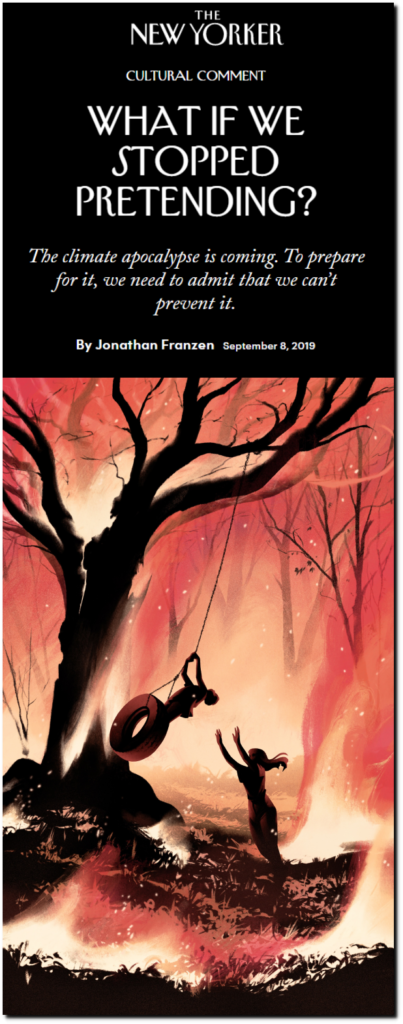https://www.newyorker.com/culture/cultural-comment/what-if-we-stopped-pretending
What If We Stopped Pretending?
The climate apocalypse is coming. To prepare for it, we need to admit that we can’t prevent it.
By Jonathan Franzen
Excerpt: There is infinite hope,” Kafka tells us, “only not for us.” This is a fittingly mystical epigram from a writer whose characters strive for ostensibly reachable goals and, tragically or amusingly, never manage to get any closer to them. But it seems to me, in our rapidly darkening world, that the converse of Kafka’s quip is equally true: There is no hope, except for us.
I’m talking, of course, about climate change. The struggle to rein in global carbon emissions and keep the planet from melting down has the feel of Kafka’s fiction. The goal has been clear for thirty years, and despite earnest efforts we’ve made essentially no progress toward reaching it. Today, the scientific evidence verges on irrefutable. If you’re younger than sixty, you have a good chance of witnessing the radical destabilization of life on earth—massive crop failures, apocalyptic fires, imploding economies, epic flooding, hundreds of millions of refugees fleeing regions made uninhabitable by extreme heat or permanent drought. If you’re under thirty, you’re all but guaranteed to witness it.
If you care about the planet, and about the people and animals who live on it, there are two ways to think about this. You can keep on hoping that catastrophe is preventable, and feel ever more frustrated or enraged by the world’s inaction. Or you can accept that disaster is coming, and begin to rethink what it means to have hope…
Even at this late date, expressions of unrealistic hope continue to abound. Hardly a day seems to pass without my reading that it’s time to “roll up our sleeves” and “save the planet”; that the problem of climate change can be “solved” if we summon the collective will. Although this message was probably still true in 1988, when the science became fully clear, we’ve emitted as much atmospheric carbon in the past thirty years as we did in the previous two centuries of industrialization. The facts have changed, but somehow the message stays the same…
Our atmosphere and oceans can absorb only so much heat before climate change, intensified by various feedback loops, spins completely out of control. The consensus among scientists and policy-makers is that we’ll pass this point of no return if the global mean temperature rises by more than two degrees Celsius (maybe a little more, but also maybe a little less). The I.P.C.C.—the Intergovernmental Panel on Climate Change—tells us that, to limit the rise to less than two degrees, we not only need to reverse the trend of the past three decades. We need to approach zero net emissions, globally, in the next three decades.
Finally, overwhelming numbers of human beings, including millions of government-hating Americans, need to accept high taxes and severe curtailment of their familiar life styles without revolting. They must accept the reality of climate change and have faith in the extreme measures taken to combat it. They can’t dismiss news they dislike as fake. They have to set aside nationalism and class and racial resentments. They have to make sacrifices for distant threatened nations and distant future generations. They have to be permanently terrified by hotter summers and more frequent natural disasters, rather than just getting used to them. Every day, instead of thinking about breakfast, they have to think about death…
Call me a pessimist or call me a humanist, but I don’t see human nature fundamentally changing anytime soon. I can run ten thousand scenarios through my model, and in not one of them do I see the two-degree target being met.
This is, to say the least, a tall order. It also assumes that you trust the I.P.C.C.’s calculations.
Psychologically, this denial makes sense. Despite the outrageous fact that I’ll soon be dead forever, I live in the present, not the future. Given a choice between an alarming abstraction (death) and the reassuring evidence of my senses (breakfast!), my mind prefers to focus on the latter. The planet, too, is still marvelously intact, still basically normal—seasons changing, another election year coming, new comedies on Netflix—and its impending collapse is even harder to wrap my mind around than death. Other kinds of apocalypse, whether religious or thermonuclear or asteroidal, at least have the binary neatness of dying: one moment the world is there, the next moment it’s gone forever. Climate apocalypse, by contrast, is messy. It will take the form of increasingly severe crises compounding chaotically until civilization begins to fray. Things will get very bad, but maybe not too soon, and maybe not for everyone. Maybe not for me.
Jonathan Franzen is a frequent contributor to The New Yorker and the author of, most recently, the novel “Purity.”Read more »

Great news! No need for Green New Deal or UN treaties! We're all F**ked! New Yorker: 'What if We Stopped Pretending the Climate Apocalypse Can Be Stopped?' -'The climate apocalypse is coming. To prepare for it, we need to admit that we can’t prevent it' https://t.co/Be4PzXjQn6
— Marc Morano (@ClimateDepot) September 8, 2019
"epic flooding, extreme heat or permanent drought". Covering all the bases!
— 𝕭𝖑𝖆𝖈𝖐𝖊𝖞𝖊𝖉𝖉𝖔𝖌 🇺🇦 🇵🇸 🏞️➡️🌊 (@blackeyeddog) September 9, 2019
#
Teen climate activist Greta Thunberg is echoing the message of the New Yorker: “I don’t want you to be hopeful, I want you to panic,” Greta declared.
She sums all climate change activists up in one sentence:
“I don’t want you to be hopeful, I want you to panic.” pic.twitter.com/wDd8OiS6RA
— Rebel News (@RebelNewsOnline) September 8, 2019


